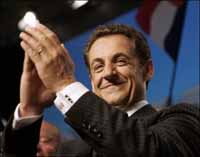Nicolas Sarkozy named new president of France, promising swift, bold action
Nicolas Sarkozy took office as the new president of France on Wednesday, waving farewell to the outgoing Jacques Chirac and promising swift, bold action to equip tradition-bound France for a new era.

Chirac, ending 12 years in power, entrusted the country's nuclear codes to President Sarkozy in a private meeting that was a highpoint of the transfer of power between the two conservatives.
A 21-gun salute from the cannons of the gold-domed Invalides, where Napoleon is buried, heralded the Sarkozy presidency.
Chirac, 74, took leave quietly. He shook hands with Sarkozy, a one-time protege turned rival, at the entrance of the ornate Elysee Palace and walked alone to a waiting car. Sarkozy - jaw clenched - returned the wave before entering his new home for the next five years.
The blunt, pro-market Sarkozy, 52, whose Hungarian father was an immigrant, is the first president of France born after World War II, a generational difference evident in his frontal approach to tackling the nation's problems.
One immediate sign of change was the touches of glamor and informality that marked the meticulously planned inauguration ceremony. A guard chatted with Sarkozy's young son, Louis. Four older children were present - two sons from Sarkozy's first marriage and two stepdaughters from his wife Cecilia's first marriage - excitedly watching the proceedings.
In his first speech as president, Sarkozy noted that he was elected May 6 with a mandate for change.
"The people conferred a mandate on me ... I will scrupulously fulfill it," he said, adding that further delays "can be fatal."
Chirac handed over the helm of the world's sixth-largest economy after two mandates marked by lackluster reforms and tensions in rundown, immigrant-packed housing projects far from the glory of the Elysee Palace.
Sarkozy becomes the sixth president of the Fifth Republic, founded by Charles de Gaulle in 1958.
Sarkozy made enemies on his way to the presidency and is reviled by many on the left. An anti-Sarkozy protest march was planned later Wednesday starting at the Place de la Bastille in eastern Paris, where post-election protests degenerated into violence on several nights last week.
Issues demanding attention include a jobless rate that hasn't dipped below 8 percent in a generation and the identity and cohesion of an old nation in a quickly changing world.
"Never has opposition to change been so dangerous for France as in this world in complete mutation, where each is trying to change faster than the others, where delays can be fatal," Sarkozy said.
He promised to restore the values of "work, effort, merit" and to "invent new solutions."
Sarkozy said that issues of security, order, authority and results were priorities of his administration.
On the global front, protecting human rights and fighting global warming will top his agenda, he said.
In a sign of his determination to act quickly, Sarkozy was leaving in late afternoon for Berlin to discuss European issues, including the hobbled European Union, with Chancellor Angela Merkel.
He also is expected to quickly form a government, appointing fellow conservative, four-time former minister Francois Fillon, as prime minister in the coming days.
The popular Bernard Kouchner, a former Socialist health minister and founder of the Nobel-prize winning organization Doctors Without Borders, is among those considered for the post of foreign minister in a streamlined Cabinet of 15 ministers. Sarkozy promises that half the ministers will be women.
Before leaving for Berlin, President Sarkozy was to parade up the Champs-Elysees, accompanied by Republican Guards on motorcycles and horseback, to lay a wreath at the Tomb of the Unknown Soldier beneath the Arc de Triomphe.
In the simple morning ceremony, Sarkozy received the insignia of the Grand Croix from the hands of Gen. Jean-Pierre Kelche, who heads the prestigious Legion of Honor and the necklace of the Great Master of the Order of the Legion of Honor. Each linked medallion of the necklace bears the name of a president, with Sarkozy's name recently added.
Earlier, Chirac and Sarkozy held talks in which the nation's nuclear codes and related state secrets were passed from the outgoing leader to the new president. That weighty moment does not preclude discussing the incidentals of daily life at the Elysee Palace: In 1995, outgoing Socialist President Francois Mitterrand asked Chirac to be sure to take care of the ducks in the garden of the presidential palace.
Sarkozy will be "more implicated in daily affairs" than his predecessors, said Henri Guaino, who took over as secretary-general, or chief of staff, of the Elysee Palace.
"He will communicate more, act more directly," Guaino said on Canal Plus television ahead of the ceremony.
The departing Chirac, criticized for being too prudent in reforming the country, leaves behind four decades in politics. In his final presidential speech Tuesday night, he urged his compatriots to stay united and proud, despite uncertainty about France's place in the world.
"I know that the new president, Nicolas Sarkozy, will endeavor to lead our nation forward on the paths of the future," Chirac said.
Subscribe to Pravda.Ru Telegram channel, Facebook, RSS!


